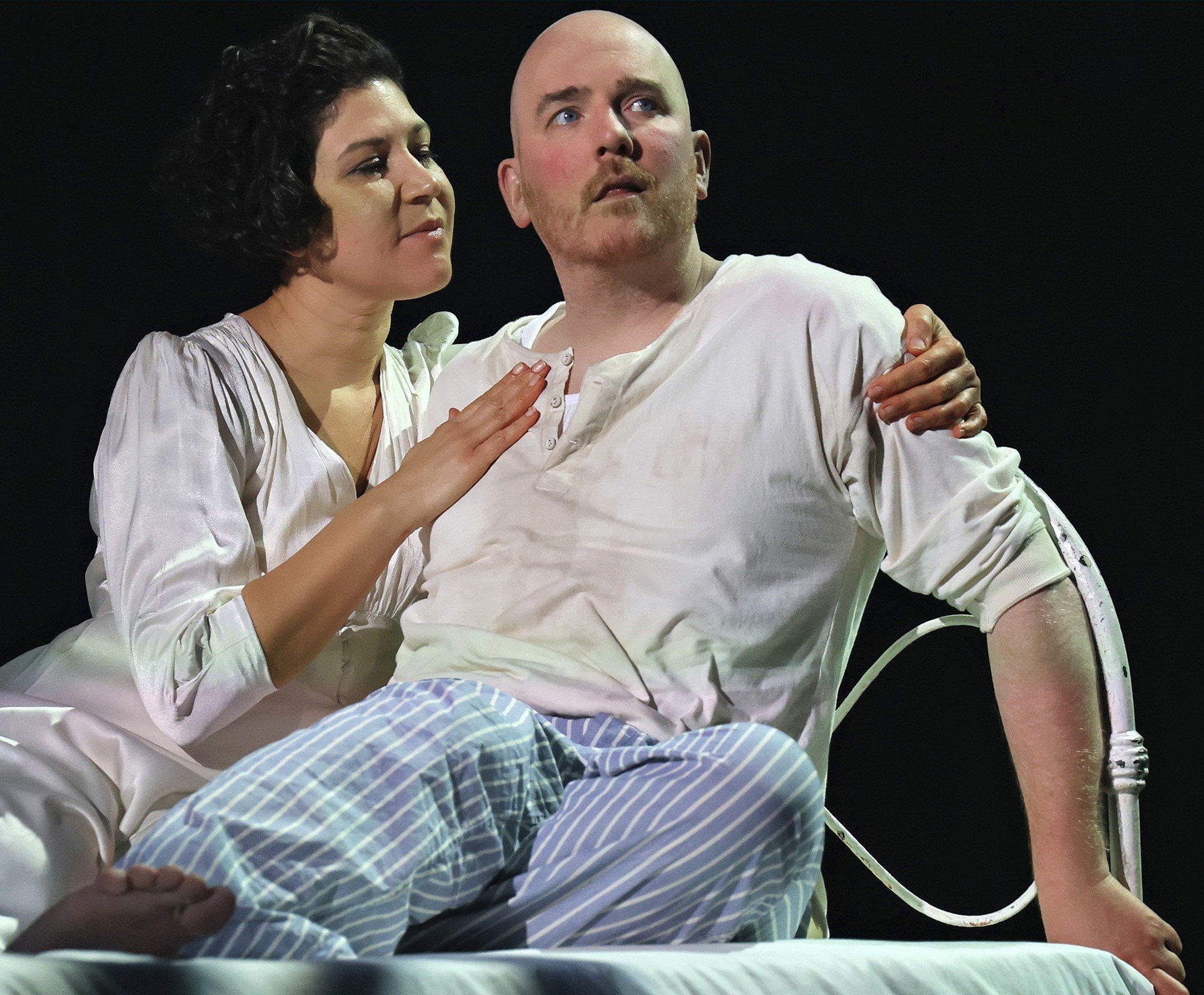From left: Laurie Scott as Ross, Nicole Cooper as Lady Macbeth, Emmanuella Cole as Lady Macduff, Taqi Nazeer as Lennox, and Adam Best as Macbeth in the banquet scene of Zinnie Harris’s reimagining of William Shakespeare’s Macbeth. Photograph by Gerry Goldstein. (Banner photograph by Hollis King.)
Theatergoers yearning to see a new spin on Macbeth need look no further than Zinnie Harris’s Macbeth (An Undoing). Written and directed by Harris, it is a feminist version of Shakespeare’s original that puts Lady Macbeth at its center. But while Harris succeeds in expanding Lady Macbeth’s presence in the story, ultimately the playwright is defeated in increasing the character’s agency, given Shakespeare’s clear-cut trajectory of the doomed Queen.
Marc MacKinnon as Murderer 2 consults with Cooper as Lady Macbeth. Photograph by Gerry Goldstein.
It's no accident that Shakespeare entitled his work Macbeth, and not Macbeth and Lady Macbeth. Although Lady Macbeth (Nicole Cooper) might be the strongest character early in Shakespeare’s original, she soon loses that strength after she discovers that “a little water clears us of this deed” doesn’t alleviate her guilt in Duncan’s assassination.
The play starts with a chorus-like character called Carlin (Liz Kettle), who serves as narrator, servant, witch, and porter. Although Carlin is gruff and accuses the audience of hungering for gore and death, she’s winning with her gutsiness and down-to-earth language:
Misery seekers—here they come. Eyes all nasty and randy for gore. You recognize yourself? Mouths open, tongues out. You’re all the same. Death is what you want—blood, despair, the fall of man? It’ll be as you last saw it—but no matter, things fare better when they are played and played again.
Two other women then arrive—the middle-aged Missy (Star Penders) and the younger Mae (Emmanuella Cole). The three soon reveal themselves as the Weird Sisters and spin prophecies for Macbeth (Adam Best) and Banquo (James Robinson) to ponder.
Lady Macbeth with Best as Macbeth. Photograph by Gerry Goldstein.
Like any playwright retooling a Shakespeare play, Harris inevitably finds herself on the horns of the dilemma of intertwining Shakespeare’s language with her own. Reportedly, the linguistic scale for her Macbeth weighs in at 60 percent Shakespeare and 40 percent her own inventions the first half; Harris relies less on Shakespeare’s language and more on poetic license in the second half.
Harris catapults the Scottish play from 11th-century Scotland to the 1930s, a time of economic depression and the rise of fascism in Europe. The set is suitably drab, although the handsome outfits worn by the royals and nobility offset the bleakness.
The Macbeths aren’t the only characters who Harris has reimagined in her distaff Macbeth. In Shakespeare, Lady Macduff is portrayed as a paragon of motherhood, in spite of the fact that her husband has betrayed her and their children by fleeing to England with Malcolm. In Harris’s version, however, Lady Macduff is a mother-to-be and supposedly Lady Macbeth’s closest friend. The darker truth about their relationship is revealed in the second half, however, after Lady Macduff has delivered her child and Lady Macbeth pleads for Lady Macduff to bring her newborn son to the palace for safety.
Lady Macduff: Bring my child to you?
Lady Macbeth: Yes, why not?
Lady Macduff: And then hear that he died in your arms like all of yours?
There’s a reversal of power—and roles—in Harris’s version. Lady Macbeth’s traditional speeches in the sleepwalking scene are handed to Macbeth. Lady Macbeth, try as she might to help her husband snap out of his paranoia (“This is madness, Lord, do not give yourself to this madness”), does not succeed.
From left: Liz Kettle as Carlin, Star Penders as Missy, and Cole as Mae in Harris’s Macbeth (An Undoing). Photograph by Gerry Goldstein.
Harris further reframes Shakespeare’s tragedy in part 2 by employing metatheatrical devices. She not only has Lady Macbeth confronted with the injustice of having to conform to the original male-written text written in 1606–07 but also suggests, courtesy of the Doctor and Ross characters, that the consequence is her mental illness and suicide.
Cooper is well-cast as Lady Macbeth. Although at first blush she looks as fresh and innocent as a cherub in a Rubens’ painting, she is more than able to project both the manly and womanly side of her character. As Macbeth, Best manages to chart the sorry progression of the protagonist from war hero to royal assassin to madman. The rest of the cast acquit themselves well, with a shout-out to Kettle as Carlin.
Harris, who has reworked Sophocles’ The Oresteia and John Webster’s The Duchess of Malfi to fine effect, comes up a bit short with her reimagining of Lady Macbeth as the focus of Macbeth. After all, Lady Macbeth’s very first words in Shakespeare’s tragedy are not her own but Macbeth’s, culled from his letter prophesying a bright future: “They have met me in the day of success.” Although Harris regards Lady Macbeth as an underwritten character in the story, perhaps the actual truth is that she only finds her agency through Macbeth.
The Royal Lyceum Theatre Edinburgh’s production of Macbeth (An Undoing) runs through May 4 at Polonsky Shakespeare Center (262 Ashland Place, Brooklyn). Evening performances are at 7:30 p.m. Tuesday through Sunday; matinees are at 2 p.m. Saturday and Sunday. No performances on April 16–18. For tickets and more information, visit tfana.org.
Playwright: Zinnie Harris (after William Shakespeare)
Director: Zinnie Harris
Sets: Tom Piper
Lighting: Lizzie Powell
Costumes: Alex Berry
Sound & Music: Pippa Murphy






